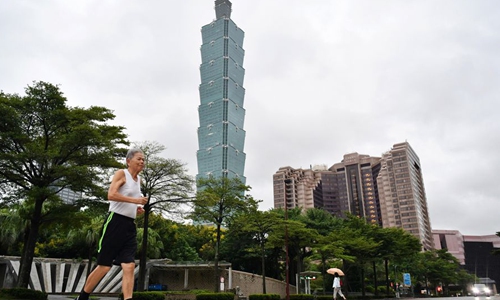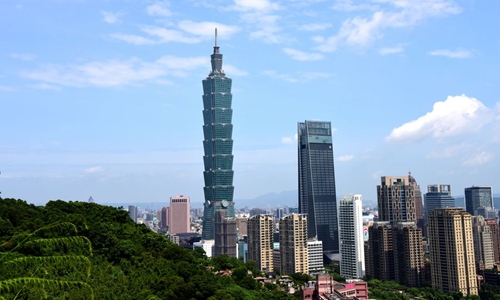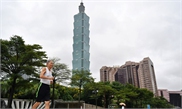
A citizen runs in front of the Taipei 101 skyscraper in Taipei, southeast China's Taiwan, on Oct. 1, 2019. Photo: Xinhu
Chiang Chi-chen has been elected as the chairman of the Chinese Kuomintang (KMT) Party, and he labeled himself as a "reformist" and hinted at abandoning the anti-separatism tradition of the party, with experts saying he might make the KMT more "localized and pro-US" instead of maintaining mutual trust with the Chinese mainland to promote cross-Straits exchanges and keep the region peaceful.
Chiang, 48, a "lawmaker" of the island's "legislature," will replace Wu Den-yih, who announced his resignation in January following the KMT's defeat in the island's regional leadership and legislative elections.
Chiang's term runs until May 2021 and then the KMT will again start an election process for a chairman for a new four-year term. After the KMT's defeat in January, among the 113 seats in the island's legislature, the pro-separatism Democratic Progressive Party (DPP) garnered 61 seats while the KMT got 38.
Xi Jinping, general secretary of the CPC Central Committee, has not sent a congratulation letter to Chiang as of press time. This was the first time since 2005 that the general secretary of the CPC Central Committee didn't congratulate the elected KMT chairman within two days.
Yu Qiang, a Taiwan affairs expert at the University of International Relations in Beijing, said that the reason is simple, which is that the CPC found the KMT is likely to abandon the political foundation that the two parties share - upholding the 1992 Consensus and opposing Taiwan separatism.
Zhu Fenglian, a spokesperson for the Taiwan Affairs Office of the State Council of China, said on Saturday that the Communist Party of China and the KMT have jointly promoted the peaceful development of cross-Straits relations and boosted the interests and happiness of compatriots of the two sides in the past "based on the shared political foundation of upholding the 1992 Consensus and opposing Taiwan separatism."
However, according to Taiwan media reports, Chiang has been identified as a "reformist" with a different view to that of the Chinese mainland and is more localized and pro-US.
"In his victory speech, Chiang promised he would realize changes within the party within a year. During the campaign, he hinted the KMT might abandon the '1992 Consensus,'" Taiwan News reported.
Chang Ya-chung, a KMT member who ran in the KMT primary for the 2020 Taiwan regional leader election and professor at National Taiwan University, told the Global Times on Saturday that Chiang represents the island's local faction in the KMT and has a different political stance to the mainland .
He might not be interested in boosting ties with the mainland, but will seek closer ties with the US, Chang said.
Chiang's victory could be a symbol that the KMT would be more localized and pro-US and will likely weaken the sense of Chinese national identity, which means it could no longer be a trustworthy partner for the mainland to cooperate with, Chang warned.
"The opportunity for cross-Straits peace is declining and the danger of military conflict is increasing, and this is probably what the US wants to see, as it can interrupt China's great plan to realize national rejuvenation," he noted.

Photo: Xinhua
In September 2019, Chiang met Joshua Wong, a Hong Kong separatist and major activist who participated in the months-long turmoil in the city, and voiced support for Wong, which has been regarded as a hostile move to the mainland, Taiwan media chinatimes.com reported.
"Currently, the cross-Straits relationship is very complicated and intense, and we hope, under the leadership of Chairman Chiang, the KMT can treasure and safeguard the existing political foundation with the CPC, play a role in bridging the two sides for communication, and keep making efforts to safeguard the peace and stability of the Taiwan Strait, as well as the interests and happiness of compatriots of both sides," Chiang said.
A Beijing-based Taiwan affairs expert who asked for anonymity said that, in fact, the mainland does not put too much faith in the KMT. In the future the DPP might emerge as a player if it sees itself staying in power, encouraging some politicians to try to play a role in communicating with the mainland, he said.
"So, to some extent, maybe current island leader Tsai Ing-wen's inauguration speech on May 20 will be more important than the KMT chairman's stance," he added.
Li Xiaobing, a Taiwan affairs expert at Nankai University in Tianjin, said if the KMT wants to reform and defeat the pro-separatist DPP next time, it should maintain its tradition and be different from the DPP rather than surrender to populism and separatism hyped by the DPP in the past few years, as the cross-Straits relationship is an advantage of the KMT.
"The reason why the people of Taiwan don't buy the KMT's stance on the 1992 Consensus and the cross-Straits relationship is that they didn't fairly distribute the benefits and effectively tell the facts to the public inside the island, but it doesn't mean being friendly with the mainland is wrong," Li said.
"So if the KMT abandons the 1992 Consensus and anti-separatism tradition, it would make a huge mistake as the boundary between the KMT and the DPP will become vague, and the mainland would have no reason to deal with it anymore," Li noted.
Chang said the mainland doesn't need to lose faith in the KMT as there are 20-40 percent of KMT members, including him, who differ from Chiang, and they would like to keep seeking the possibility of a peaceful reunification with the mainland.
"Political events within Taiwan are not that important for the mainland and there is no need to be disappointed or panic, as by nature, the Taiwan question is a competition and gamble between two superpowers - China and the US," Li said.
If China's overwhelming advantage continues to grow and brings more significant change to the China-US power balance, the US might get pragmatic and help us contain Taiwan separatists and keep alive the hopes of peaceful reunification he added.
"Otherwise if a peaceful solution becomes totally hopeless, China's massive military operations to liberate the island will bring a great loss to US strategic



